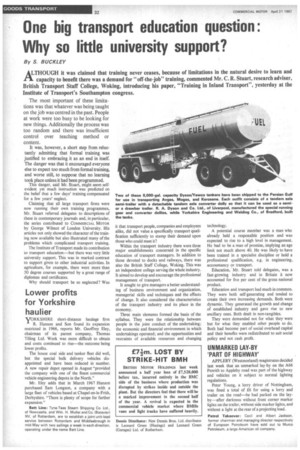One big transport education question: Why so little university support?
Page 34

If you've noticed an error in this article please click here to report it so we can fix it.
By S. BUCKLEY
ATHOUGH it was claimed that training never ceases, because of limitations in the natural desire to learn and capacity to benefit there was a demand for "off-the-job" training, commented Mr. C. R. Stuart, research adviser, British Transport Staff College, Woking, introducing his paper, "Training in Inland Transport", yesterday at the Institute of Transport's Southampton congress.
The most important of these limitations was that whatever was being taught on the job was centred in the past. People at work were too busy to be looking for new things. Additionally the process was too random and there was insufficient control over teaching method or content.
It was, however, a short step from reluc
tantly admitting that formal training was justified to embracing it as an end in itself. The danger was that it encouraged everyone else to expect too much from formal training, and worse still, to suppose that no learning took place unless it had been programmed.
This danger, said Mr. Stuart, might seem selfevident yet much instruction was predicted on the belief that a few days' training compensated for a few years' neglect.
Claiming that all large transport firms were now running their own training programmes, Mr. Stuart referred delegates to descriptions of these in contemporary journals and, in particular, the series contributed to COMMERCIAL MOTOR by George Wilmot of London University. His articles not only showed the character of the training now available but also illustrated many of the problems which complicated transport training.
The Institute of Transport made its contribution to transport education—but there was very little university support. This was in marked contrast to support given to other industrial activities. In agriculture, for example, there were more than 50 degree courses supported by a great range of diplomas and certificates.
Why should transport be so neglected ? Was it that transport people, companies and employees alike, did not value a specifically transport qualification sufficiently to stamp their demand upon those who could meet it?
Within the transport industry there were three major establishments concerned in the specific education of transport managers. In addition to those devoted to docks and railways, there was also the British Staff College, Woking. This was an independent college serving the whole industry. It aimed to develop and encourage the professional management of transport.
It sought to give managers a better understanding of business environment and organization, managerial skills and techniques and the effects of change. It also considered the characteristics of the transport industry and its place in the economy.
Three main elements formed the basis of the syllabus. They were the relationship between people in the joint conduct of the undertaking; the economic and financial environment in which undertakings operated; and the opportunities and restraints of available resources and changing technology.
A potential course member was a man who already held a responsible position and was expected to rise to a high level in management. He had to be a man of promise, implying an age limit not much above 40. He was likely to have been trained in a specialist discipline or hold a professional qualification, e.g. in engineering. accountancy or transport.
Education, Mr. Stuart told delegates, was a fast-growing industry and in Britain it now accounted for five per cent of the gross national product.
Education and transport had much in common. They were both self-generating and tended to create their own increasing demands. Both were dynamic. They generated the growth and change of established industry and gave rise to new ancillary ones. Both dealt in non-tangibles.
They were demanded not for what they were but for what they enabled other people to do. Both had become part of social overhead capital and their benefits were redistributed to suit social policy and not cash profit.




































































































































